If you are experiencing problems with your Pelvic Floor, whether that’s:
- Dribbling or leaking,
- Struggling to control your bladder,
- Pain in the Pelvic Floor,
- Pain during sex,
- Prolaps,
- Bowel related incontenence,
You need expert, distrete expert help from a kind, friendly and experiences team.
At Ashbourne Physiotherapy & Sports Injuries Centre we have been providing a specialist Pelvic Physiotherapy service to women from Ashbourne and the surrounding area for over 20 years.
Gynaecological conditions such as stress or urge related urinary incontinence, bowel related incontinence, pelvic organ prolapse and pelvic pain are all conditions that impinge greatly on the daily lives of those affected. It can lead feeling of loss of control and isolation for some.
Physiotherapy can help to restore that control and empower you to manage your conditions and return to the activities you want. In many cases we can help and provide real improvements for suffers. We have Specialist Physios who have an interest in Pelvic Pain and related conditions who would be happy to discuss how physiotherapy may help you. Please contact the centre to arrange an appointment with Gillian, Elizabeth or Anna or ask to speak with one of us if you want to discuss further.
Other Symptoms You May Feel
- Bladder:
- leakage with coughing, sneezing and activity which may include sexual intercourse (stress urinary incontinence)
- urgency – a sudden need to go to the toilet that may include leakage (urge urinary incontinence)
- going to the toilet too often (frequency)
- getting up at night to go to the toilet (nocturia)
Bowel:
- leakage with activity or urge (anal incontinence)
- difficulty getting clean after bowel movements
- leakage of wind
Vaginal:
- a feeling of something coming down, or heaviness (pelvic organ prolapse)
- pain which can be vaginal or sometimes abdominal
- lack of sensation during sex
Pelvic floor muscle training improves both symptoms and severity of prolapsed in women with Pelvic Organ Prolapse
(Braekken et al 2010, Hagen et al 2009, 2011, 2014, Frawley et al 2012, Hagen et al 2014)
Pelvic Physiotherapy can offer help in all of the above by offering an assessment and explanation of your condition, after which with your therapist you can help you plan your rehabilitation. This may be as simple as re-educating your drinking and toileting habits combined with a home exercise programme or in some cases you may require more help.

Pelvic Floor Muscles
Up to 60% of all women experience a problem with their pelvic floor muscles at some time during their life. The most common problems are leaking with activity, sneezing or coughing (stress urinary incontinence) and pelvic organ prolapse (a feeling of something coming down in the vagina).
All the bladder, bowel and sexual functions require good pelvic floor muscles. Your pelvic floor muscles are important in posture, and with the abdominal muscles, help to support your spine.
6 in 10 women have problems
Not all women with symptoms have weak pelvic floor muscles, but sometimes they need to learn to use their pelvic floor muscles in the right way and at the right time.
Why do problems occur with the pelvic floor muscles?
The pelvic floor muscles can be weak, overstretched, slow to work, too tight or torn just like the other muscles of your body.
Problems can be caused by:
- Childbirth
- Chronic Constipation
- Heavy or repeated lifting
- High impact exercise
- Being very overweight
- Smoking
- Menopause
Other conditions which affect the muscles may have an effect on the pelvic floor muscles e.g. neurological conditions and diabetes.
Physiotherapy can be invaluable in offering help for a variety of conditions related to pregnancy such as:
- Hip pain
- Back and sacroiliac pain
- Sciatica
- Symphysis Pubis Dusfunction
- Diastasis of Rectii (separation of the tummy muscles postnatally)
- Incontinence
Treatments that may be of benefit include:
- Acupuncture
- Manual therapy
- Exercise and advice
- Biofeedback from ultrasound or EMG postnatally

EMG & Ultrasound
Here at Ashbourne after hearing your history and assessing your function we will plan your treatment with you and set the goals you wish to achieve. A significant time will be spent on education and advice in order that you can understand your problem and how to help yourself. Most treatments involve exercises that you will be asked to work on at home, between clinic visits, but often it is helpful to use biofeedback in order to educate in the most effective way to recruit the muscles that may be struggling. We use both ultrasound scanning and electromyography (EMG) to enable women to visualise the pelvic floor and abdominal muscle activation. This can be both in the clinic and, with the use of a portable EMG machine, at home in some cases.
EMG involves the use of a small electrode which can pick up the electrical activity of the motorneurone units as the muscles are activated (a little like ECG does with the heart). This shows a read out on a computer screen which enables us to see not only when the muscle is working but at what level which is very helpful when the problem is related to control of the muscle rather than just strength.
Pelvic pain conditions, with no systemic cause, often cause misery to the sufferer. Often they may be related to musculoskeletal dysfunction or to pelvic floor muscle issues and general instability which is why we feel that as physiotherapists we can be in an ideal position to assess and manage.
Please contact the centre to arrange and appointment with Gillian, Elizabeth or Anna or ask to speak with one of us if you want to discuss how physiotherapy may help you.

Why Choose Us for Pelvic Health Physiotherapy
- Specialist expertise – Over 20 years providing pelvic health physiotherapy in Ashbourne and Derbyshire.
- Highly qualified clinicians
- Evidence-based care – Using EMG and ultrasound to guide pelvic floor rehabilitation and education.
- Comprehensive support – Helping with incontinence, prolapse, pelvic pain, pregnancy-related issues, and postnatal recovery.
- Patient-centred approach – Sensitive, supportive, and discreet care in a welcoming environment.

Specialist Physios

Dr Gillian Campbell
Dr Gillian Campbell BSc Hons, PhD, Reg with HCPC, Full Member of Pelvic, Obstetric and Gynaecological Physiotherapy (POGP).


Elizabeth Griggs
BSc (Hons), MCSP, Registered with the Health & Care Professions Council, Affiliate member of POGP.

Anna Schratz
Diploma in Physiotherapy, MCSP, Registered with the Health & Care Professions Council, Affiliate member of POGP.
Useful Links
Bladdermatters
Supportedmums
Menopausematters
Pelvic Pain Foundation
Pelvic, Obsteric And Gynaecological Physiotherapy
Diaphragmatic Breathing Exercise
A Short Guide To The Conditions Associated with Pelvic Floor Weakness And Its Rehabilitation:
Pelvic Health Information Leaflet
Vaginal Dryness
Urogenital Problems
Migraine & HRT
Complementary & Alternative Therapies

